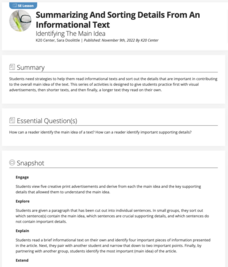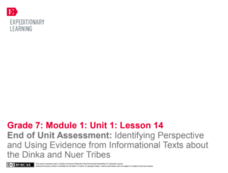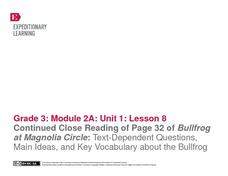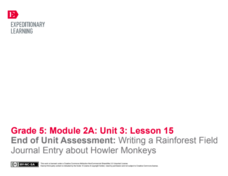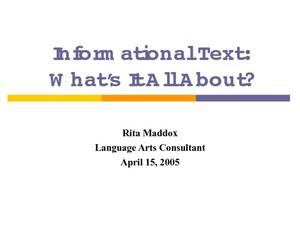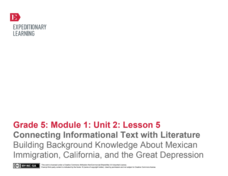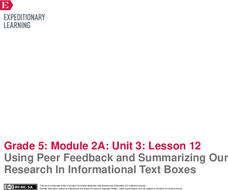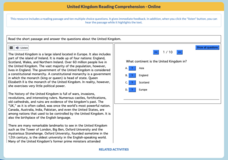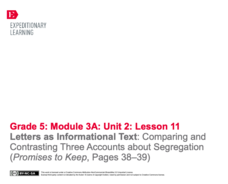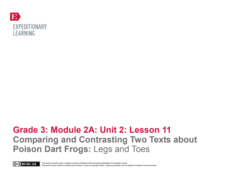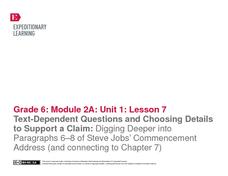Mark Twain Media
Understanding Informational Text Features
Everything you need to know about informational text features can be found in this resource. Recognizing these types of text features and how they are used in text allows readers to better understand information. Teachers can use this as...
EngageNY
End of Unit Assessment: Analyzing an Informational Text
Scholars wrap up the unit by taking an assessment and reading the informational text "You Trouble" by Justin O'Neill. As they read, they answer multiple-choice questions and complete charts to analyze the main idea and supporting details...
K20 LEARN
Summarizing and Sorting Details from an Informational Text: Identifying the Main Idea
Scholars participate in two activities that teach them to identify the main idea and key supporting details in informational text. Partners create a visual that reflects the main idea and key supporting details in an informational text...
Fluence Learning
Writing About Informational Text: Beyond the Beyond—Galaxies
Everyone has a different point of view, even when it comes to the enormity of the universe. Two separate text passages explain the scope of a galaxy, prompting young readers to write an essay about each author's argument and how the...
EngageNY
End of Unit Assessment: Identifying Perspective and Using Evidence from Informational Texts about the Dinka and Nuer Tribes
Pupils consider the varying perspectives of people in different cultural groups as they read an informational text about the Dinka tribe of Southern Sudan and complete graphic organizers. They also respond to a constructed-response...
EngageNY
Summarizing Informational Text: “Hawaii’s Endangered Happy Face Spider”
Put on a happy face. Using an interesting resource, pupils read an informational text about Hawaii's endangered Happy Face Spider. Next, they participate in a jigsaw discussion to find the gist of the article.
EngageNY
Mid-Unit Assessment: Close Reading of Bullfrog at Magnolia Circle: Bullfrog Life Cycle
The sixth lesson plan in this Bullfrog at Magnolia Circle unit assesses your third graders' ability to read and understand informational text. The included assessment asks learners to take notes about the main idea and supporting details...
EngageNY
Close Reading of Bullfrog at Magnolia Circle: Text-Dependent Questions, Main Ideas, and Key Vocabulary about the Bullfrog
As your 3rd grade class finishes reading Bullfrog at Magnolia Circle, the eighth lesson plan of this unit helps readers from an understanding of the very specific information on the final page of the book. As with the entire unit,...
EngageNY
Continued Close Reading of Bullfrog at Magnolia Circle: Text-Dependent Questions and Vivid Words and Phrases
As 3rd graders continue reading Bullfrog at Magnolia Circle, they focus on the concepts of predator and prey in the fifth lesson plan of this unit. Scholars further develop their ability to answer questions using evidence from the text...
EngageNY
End of Unit Assessment: Writing a Rainforest Field Journal Entry about Howler Monkeys
Give me more details. Scholars complete an end of unit assessment by creating an information text box to go with their field journal entries about howler monkeys. Learners use the class time to work independently.
Curated OER
Informational Text: What's It All About?
With the Common Core State Standards' growing focus on informational text, it's the perfect time to showcase this PowerPoint to your team of teachers. It's 59 slides focus on seven best practice structures: reading-as-thinking,...
EngageNY
Connecting Informational Text with Litearature: Building Background Knowledge About Mexican Immigration, California, and the Great Depression
Help your class transition as the setting in the novel Esperanza Rising, by Pam Muñoz Ryan, moves from Mexico to California. Beginning with prior knowledge, and moving into jigsaw research groups, class members add to and create posters...
Worksheet Web
Analyzing the Text
Practice analyzing informational text with a reading passage that details the Great Depression. Scholars read about the impacts of World War I, the Roaring Twenties, and the Depression, then answer 10 true or false questions.
EngageNY
Using Peer Feedback and Summarizing Our Research In Informational Text Boxes
Insert text box here. Learners use index cards to create their own informational text boxes. The text box includes information about an insect in the rainforest. Scholars also complete the draft of their research science journal entries.
EngageNY
Grade 9 ELA Module 3, Unit 1, Lesson 5
Ninth graders study the study of animals in an informational text lesson plan that focuses on analyzing text structure. As learners continue reading the first chapter of Temple Grandin's Animals in Translation, they form inquiries and...
Fluence Learning
Writing Informative Text: Did Shakespeare Write Shakespeare?
William Shakespeare penned some of the richest and most fascinating works of literature—or did he? Middle schoolers read three brief informative passages and conduct additional research to evaluate the claim that Shakespeare did not...
EngageNY
Using Informational Text Features and Learning Freaky Frog Vocabulary
What kind of text features help children build a strong vocabulary? Class members use text features such as headers to unpack new vocabulary words. They create vocabulary journals in which they will write what they think the definition...
Mr. Nussbaum
United Kingdom
An interactive practice tests scholars' reading comprehension skills. Learners read an informative text, then answer 10 questions.
EngageNY
Letters as Informational Text: Comparing and Contrasting Three Accounts about Segregation (Promises to Keep, Pages 38–39)
Letters ... a lost art or good resource? Scholars add letter writing to their informational text chart and describe the features of a letter. They then look at page 38 in Promises to Keep and complete a Perspectives Venn diagram. To...
Core Knowledge Foundation
Unit 2: Early American Civilizations
Fifth graders explore early American civilizations in a four-week ELA unit. Every lesson offers an opportunity to read and discuss a selected passage followed by word work that covers vocabulary, grammar, and morphology. Learners write...
Core Knowledge Foundation
Unit 4: The Renaissance
The Renaissance is the theme of a five-week unit designed to boost reading comprehension, spelling, vocabulary, and expository writing skills. Scholars listen to and discuss daily readings and engage in skills practice activities...
EngageNY
End of Unit 1 Assessment: Analyzing an Interview with a Rainforest Scientist Part 2 and Comparing and Contrasting Texts About Rainforest Biodiversity
The end is in sight. Pupils complete an end of unit assessment, analyzing an interview with a rainforest scientist and then comparing and contrasting two informational texts. Next, they complete a self-assessment to reflect on their...
EngageNY
Comparing and Contrasting Two Texts about Poison Dart Frogs: Legs and Toes
A lesson plan challenges scholars to compare and contrast two readings about Poison Dart Frogs. Information presented comes from different informational texts, followed by a discussion, and the completion of a Venn diagram. A one-page...
EngageNY
Text-Dependent Questions and Choosing Details to Support a Claim: Digging Deeper into Paragraphs 6–8 of Steve Jobs’ Commencement Address (and connecting to Chapter 7)
Readers learn how to choose specific details drawn from a primary source (Steve Jobs' 2005 Stanford University commencement address) to support an analysis of informative text.




